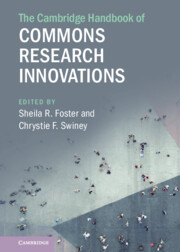Book contents
- The Cambridge Handbook of Commons Research Innovations
- The Cambridge Handbook of Commons Research Innovations
- Copyright page
- Contents
- Figures
- Tables
- Contributors
- Introduction
- Part I Revisiting the Origins and Evolution of Commons Thought
- 1 Linking the Origins and Extensions of Commons Theory
- 2 The Tragedy of Garrett Hardin’s Commons
- 3 Kinship and Commons: The Bedouin Experience
- Part II Averting New Tragedies
- Part III New Forms of Contested Commons
- Part IV Urban Landscape and Infrastructure as a Commons
- Part V Reassessing Old and New Institutions for Collective Action
- Part VI Managing and Restoring the Commons
- Part VII Law, Legal Theory, and the Commons
- Part VIII Technology, the Internet, and the Future of Commons Governance
- Index
3 - Kinship and Commons: The Bedouin Experience
from Part I - Revisiting the Origins and Evolution of Commons Thought
Published online by Cambridge University Press: 29 October 2021
- The Cambridge Handbook of Commons Research Innovations
- The Cambridge Handbook of Commons Research Innovations
- Copyright page
- Contents
- Figures
- Tables
- Contributors
- Introduction
- Part I Revisiting the Origins and Evolution of Commons Thought
- 1 Linking the Origins and Extensions of Commons Theory
- 2 The Tragedy of Garrett Hardin’s Commons
- 3 Kinship and Commons: The Bedouin Experience
- Part II Averting New Tragedies
- Part III New Forms of Contested Commons
- Part IV Urban Landscape and Infrastructure as a Commons
- Part V Reassessing Old and New Institutions for Collective Action
- Part VI Managing and Restoring the Commons
- Part VII Law, Legal Theory, and the Commons
- Part VIII Technology, the Internet, and the Future of Commons Governance
- Index
Summary
This chapter challenges a key precondition for many sustaining commons institutions - tight-knit communities. It argues that the gradual transformation of traditional nomadic societies into modern urban societies reflects a major change that has weakened the ability of kinship relations to serve as a social incentive to support sustainable common property regimes resulting in the fostering of a modern urban tragedy of the commons.
The chapter illuminates this argument by analyzing theories of social evolution and examining closely the urbanization processes undergone by Bedouin society in Israel, in which tight kinship relations traditionally supported sustainable management of the commons. The urbanization of Bedouin society challenged this traditional regime and triggered the evolution of private urban-style property units, on the one hand, and modern tragedies of the commons, on the other.
The chapter raises the question whether societies in which kinship ties have become less powerful can still produce strong enough incentives for collaboration.
- Type
- Chapter
- Information
- The Cambridge Handbook of Commons Research Innovations , pp. 34 - 42Publisher: Cambridge University PressPrint publication year: 2021

